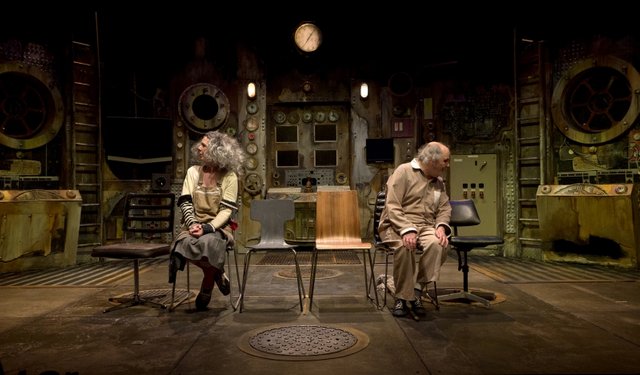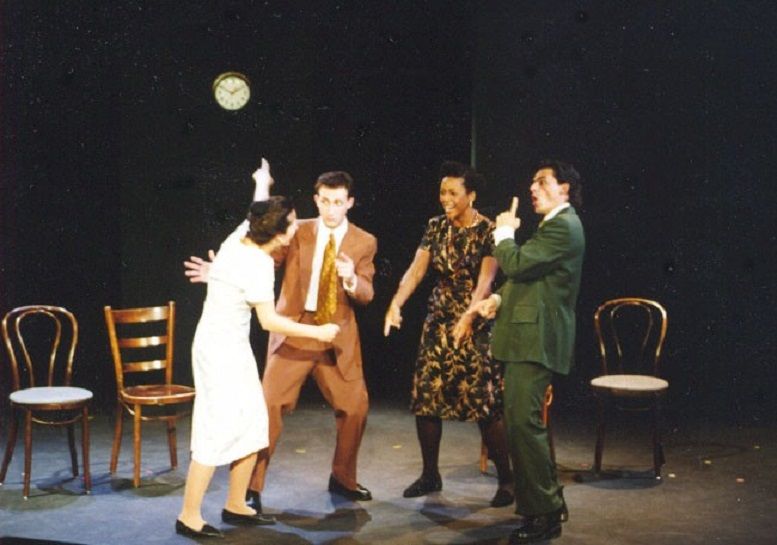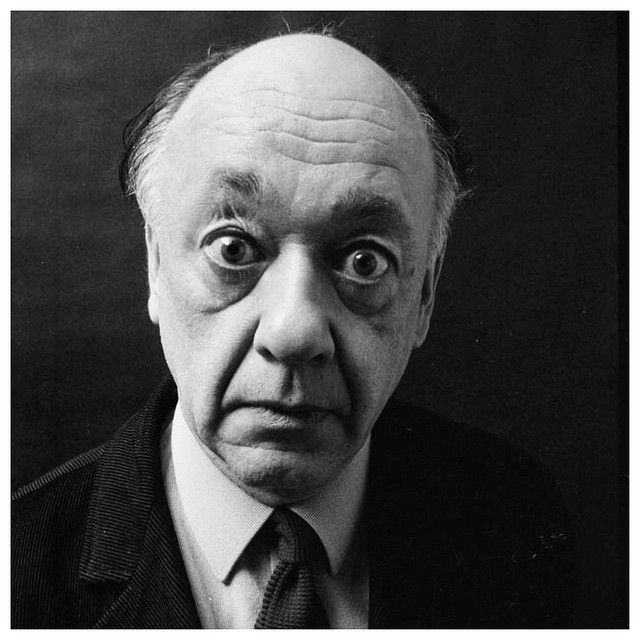The creativity of Eugene Ionesco /part one/
Eugene Ionesco is born in november 26 in the small town of Slatina, Romania and dies in Paris. In 1913, his family brought him to France, where he remained alone with his mother, a French woman, when his father, a Romanian lawyer, returned to Bucharest in four years to pursue his profession there. He is in a boarding house, suffers from loneliness. During the first years in Paris he became addicted to the street puppet theater, which is most often shown in the gardens of the Luxembourg Palace. "I found myself there, I could stay for days, enchanted by the magic of the puppets," Ionesco recalls later. And I did not laugh at all. "At the age of ten he wrote his first" historical play "on 32 pages of a school notebook. It is titled "Pro Patria". In 1925, he was already a student at a college in Bucharest, where he followed his father as recorded in the divorce lawsuit that finally divided his parents. He mastered the new language - the Romanian one, which he recommends as "the most beautiful language in the world". It can be said that during this period he experienced a profound metamorphosis: "The color of my face faded, my eyes lost my shine, my nose was flattened, my mouth grew thicker. I became ugly. "This double alienation from himself, from the language (French) and from his body will become the main engine of his desire to write. At the age of seventeen he published a collection of poems ("Elegy for Tiny Beings") and cast a project for a play. In 1930 he published in the Zodiac magazine his first literary-critical article, which marked the beginning of his long and fruitful collaboration with many Romanian magazines.
In 1932, enthralled by the work of the Italian Marineti who delivered three lectures in Bucharest, and thanks to readings of Benedetto's aesthetic writings,Eugene Ionesco deliberately challenged the first scandal by attacking three prominent Romanian writers of that time. In 1935 he was appointed as a teacher in French in a single Bucharest school. The next year he married. The fascist gangs broke out of the streets of Bucharest. He left for Paris in 1938 as a scholarship of the French state. The war forced him to return to Romania in 1940, but he would escape definitively from his two years later. Housed in Lyon, he continued to write anti-fascist articles about Romanian magazines and worked as a collaborator in various publishing houses. As he interacts with theater actors and the avant-garde actors, he is obsessed with the idea of cheering his friends with a play that is imitation of a play, a fake play that is in clear contradiction to the imposed realistic theatrical tradition, which is, in short, an expression of freedom. With such intent, he began to write between 1948 and 1949 the play "The Bald Singer", which provoked the fierce criticism of the Parisian theatrical connoisseurs present at his premiere in 1950. He became known for his strange positions during the controversy that swirled around the world of the theater, the self-confident Ionesco began in 1952 to give a play on stage every year. His world fame is brought to him by the plays "The Rhinoceros" and "The King Dies". He was officially recognized by the theatrical and literary circles: in 1970 he joined the French Academy as a permanent member and in 1984 he became a cavalier of the Order of the Legion of Honor. After a long-time French national, Ionesco commented on the collapse of the Communist regime in Romania in 1989: "As a culture I am a Frenchman, but I feel that I am again a Romanian." He appeals to the international community to help the Romanians. Ionesco died on 28 March 1994 in Paris.

Production shot from The Chair - image
Creativity
By destroying the theater conventions, the playwright Ionesco introduced a strange comism from the 1950s on the stage, fueled by the mismatch between gestures and language. In this world of the theater of absurdity, where a playful play of dramatic play, and a dramatic text of ridiculous play must be built, the failure of meaning becomes a tangible reality, marked above all by man's original loneliness and the tragedy of a meaning existence. After learning to learn English using the "Assimil" method, Ionesco realizes that words could lose their meaning and become simply "sounding envelopes." The clustering of clichés may give the impression that his first play is a parody, and he only seeks to laugh, but "The Bald Soprano" really recreates the feeling of anxiety, dizziness, and disgust. Because the author writes not humorous sketches, but rather reveals the "tragedy of language".The real father of the absurd theater, along with Samuel Becket, the playwright is not content to show the funny in the situations. He seeks to uncover the unusualness of human condition, which even language - the most sophisticated means of producing meaning - can neither explain nor dismiss in oblivion. With each of his new plays, Ionesco dismantled the complex machine of existence to get to know his hidden mechanisms. In order to save the man from his monsters, he will discover, in the second period of his creation, a new dramaturgical language that is not logically related to caricature, which therefore has a liberating effect.

Shot from "The Bald Soprano" image
Ionesco uses laughter as a means to overcome the absurdity. He notices that the most banal speech can become autonomous to specific situations and begin to obey the laws derived from its own functioning. This discovery has a devastating effect on clichés and images accustomed to the general public. While the avant-garde show their ambition to change the world, Ionesco uses laughter to overcome his absurdity. The banal situation, a "evening family meeting between old acquaintances," turns into an abstract world in "The Bald Soprano" with the first words spoken by Mrs Smith: the alienation hopes for the battered garments to penetrate into the dark areas of the human mind, is repeated.... tirelessly repeated. Moreover, what is repeated in the language is unrelated to what is repeated in the situations. The two worlds superimpose each other without ever encountering reality. Similarly, Smith and the Marten family live two separate worlds. In a well-known scene, after a long series of misconceptions, Marten finds out that both partners are truly husband and wife, as they sleep in the same bed, live in a house, meet each day, and actually live together. Seriousness is deliberately upset and comical is born of repetitions. It is born, as Adorno claims, "a poetry that denies language." In Ionesco, the comic raises alarming questions about the meaning of everyday phrases. Until 1957, the language was loaded with tension in every play of Ionesco, releasing the dark forces of the man who remained until then silent. Thus, in "The School" (1951), a dishonest teacher engrossed in his hollow rhetoric, devoid of any meaning, would turn a young, cheerful and carefree girl into a sacrifice. The only purpose of the lecturer is the ritual murder of the other's words.

Thanks for the post @godflesh! I read during high school The Bald Soprano, but was not familiar with all the ideas of absurdity behind its content, thus I just did not get it, until college, where I began to understand the Theatre of Absurd. Though I didn't know that he used laughter as a means to overcome the absurdity.
I have make the same mistake in high school :D But I still like it without understand it :D
Hehe then that situation is more common than what I thought
You got a 9.51% upvote from @postpromoter courtesy of @godflesh!
Want to promote your posts too? Check out the Steem Bot Tracker website for more info. If you would like to support the development of @postpromoter and the bot tracker please vote for @yabapmatt for witness!
What an interesting read about the great Eugene. This writeup really made me to know much more about him. I have come across his work, "The Rhinoceros" but unfortunately didnt have enough time to read it then. I think it is time for me to do that. @godflesh, thanks for the writeup
I am glad to hear that :)
"The Rhinoceros" is a masterpiece! And again, it's so important to this days with the totalitarian collective feeling that emerges under new masks.
interesting waiting for next part ☺☺
Here it is : https://steemit.com/story/@godflesh/the-creativity-of-eugene-ionesco-part-two :)